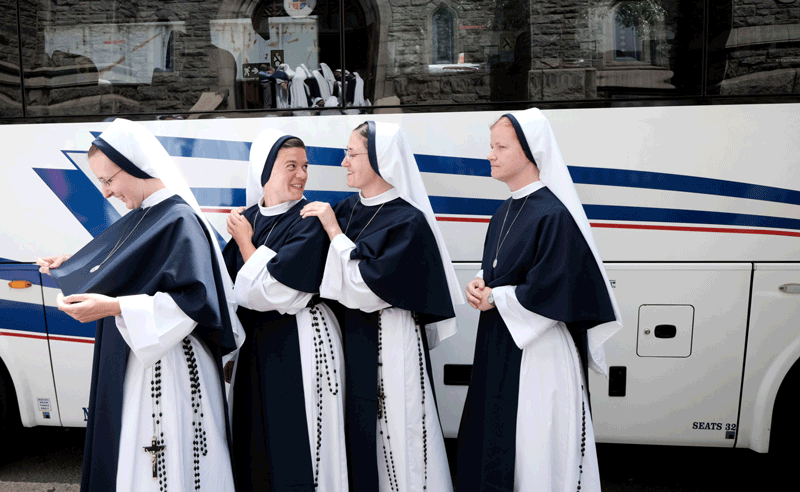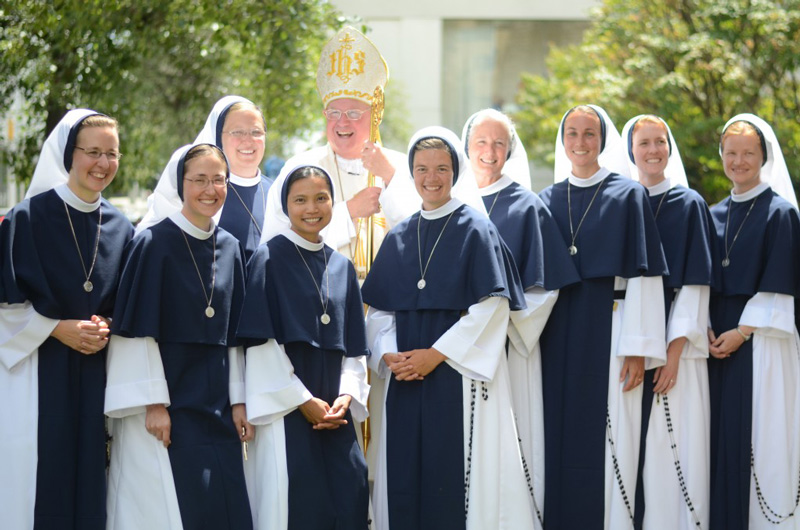(NYT, Mike Oppenheimer) Mechanical bulls, rock-climbing walls, bounce houses, go-karts: Before becoming a nun, Sister Virginia Joy helped insure them all.
“I was a go-between between the underwriters and the customers,” said Sister Virginia Joy, a former high school soccer star from South Carolina now wearing a habit of white and navy blue. She was fighting Midtown Manhattan traffic, late for a lunch with some other nuns. “I was overwhelmed by the Lord’s generosity in my life, and I wasn’t fulfilled in this job,” she said.
In 2009, at age 28 and then known as Virginia Cotter, she joined the Sisters of Life.
Young women joining religious orders have become increasingly rare over the years. The number of “women religious” in the United States is about 50,000, less than a third of that in 1966. According to a Georgetown University study, “there are more Catholic sisters in the United States over age 90 than under age 60.”
The younger nuns can be a surprising bunch. While many in the older generation moved to the left after the 1960s, in theology and politics — a trend that led in part to Pope Benedict XVI’s investigation of American nuns in 2012 — younger nuns tend to be more conservative. They want to wear the habit. While they work outside their communities, they have a strong focus on contemplative life, making time for hours of daily communal prayer. And they tend to have a strong sense of a particular mission.

Take, for example, the Sisters of Life, the religious order of Sister Virginia Joy. Many of the nuns are in their 20s or 30s and have a commitment that can be divisive even in the Roman Catholic Church: “promoting life,” which in practice includes an emphasis on discouraging abortions.
The members may hold to traditional teachings, but as they see it, there is nothing more countercultural in 2015 than a young woman’s becoming a nun — eschewing careerism, material possessions, sex. Two other traditionalist orders — a Dominican order in Nashville, and one in Ann Arbor, Mich., which has expanded to Austin, Tex. — have attracted national attention; in 2010, the Ann Arbor nuns even made it on “Oprah.”
Margaret Guider, a Franciscan nun who teaches at Boston College, said young women were attracted to these orders not by any one political slant but by an old-fashioned sense of focus and identity. Where many religious orders now allow nuns to choose their dress, or their career, these groups dress alike, pray often together and all work in one field, be it as schoolteachers or in anti-abortion activism.
“What characterizes those groups is they tend to have maintained what I would call a conventional life,” Dr. Guider said. “They live in convents or designated communities, they tend to have a traditional habit and they tend to have a very focused ministry. Their life has a real focus and continuity that holds the whole group together all of the time.”
All of the 84 Sisters of Life have joined since 1991, when Cardinal John J. O’Connor, who was the archbishop of New York, founded the order. Ten postulants, or first-year members, are expected in September. On Thursday, at the order’s retreat center in Stamford, Conn., eight sisters professed “final vows,” making a commitment for life. To the traditional vows of poverty, chastity and obedience, the Sisters of Life add a fourth vow, “to protect and enhance the sacredness of every human life.”

“They have a very clearly defined focus,” said Brother Paul Bednarczyk, the executive director of the of National Religious Vocation Conference in Chicago. “There was a very real need which Cardinal O’Connor responded to, and that real need captures the imagination of younger women.”
The Sisters of Life work with about 1,000 pregnant women a year, at several sites including a home for expectant and unwed mothers in the Hell’s Kitchen neighborhood in Manhattan, a mission on the East Side of Manhattan and a mission in Toronto. They operate a house for first-year members in the Bronx. Last year, at their Stamford retreat center, more than 4,000 people attended retreats, including weekends for women “healing after abortion.” Next month, four sisters are opening the order’s newest mission in Denver.
The sisters, who take no salary, oppose all taking of life, including war, but they place an emphasis on abortion.
“Our experience is that once a woman is given the love and practical support that she needs and deserves, she almost always desires to carry her baby to term,” said Sister Mary Elizabeth, who was acting as a spokeswoman for the group.
The women the order helps may be referred by priests or friends. Some come via Google searches. Others may have walked past the missions before deciding to step inside. Some women talk with the sisters, then have abortions anyway.
The order relies on private donations, and the sisters come from the United States, Australia, Canada, Ireland, New Zealand and Spain. All of them have surprising stories.
“I was very passionate about the environment,” said Sister Antoniana, 34, a Filipina-Canadian. “I studied environmental science at the University of British Columbia. That dovetailed with a passion for human life.”
As a child, on a cross-Canada drive with her family, Sister Antoniana was awed by the Rockies, and the sight convinced her of God’s existence. After college, she became interested in “the protection of vulnerable human life,” and traveled to Rome for World Youth Day. “I was kneeling in a little chapel, and I heard him ask me, ‘Will you love me with an undivided heart?’ ” She decided to be a nun.
After college, Sister Grace Dominic, now 35, got a job at a Catholic newspaper. Her first day was Sept. 11, 2001. “It was the witness of the firefighters going into the burning buildings,” she recalled, when asked what started her on a path to the convent.
In the Sacred Heart of Jesus Convent, the Hell’s Kitchen home for expectant mothers (who may stay for a time after their babies are born), five nuns explained life for the pregnant women in the convent, which sounded pleasant, in an enforced way.
“There’s not a TV they can watch,” Sister Fiat said. “There’s a beauty of silence and peace in their lives.”
“We try to celebrate a lot,” Sister Marie Veritas said. There are parties for “a birthday, a birth, finding out the baby’s sex.”
At the house in the Bronx, a postulant, or first-year member, Jackie Zuppe from Waltham, Mass., said she had always wanted to be a veterinarian. But in college, she said she “fell in love with the whole human person” and realized that she could not devote her life to animals. She met several Sisters of Life through her Catholic campus group.
“I remembered how young they were,” Sister Jackie said. “And the fact that they loved ultimate Frisbee.”
In their private counseling, on retreats and in speeches to students, the nuns explain their grander battle against the “contraceptive mentality,” to use the conservative Catholic term of choice. The use of condoms or birth control pills is, for them, simply not permissible. In this regard, they hold to traditional Catholic teachings that the majority of lay Catholics reject.
Sister Mary Concepta, who joined the order at age 27, will be one of the four missionaries moving to Denver. She said this new mission would focus on outreach to university students.
“Our charism,” Sister Mary Concepta said, using the Catholic word for a special gift to the world, “is meeting a need of this time: Life is not upheld. There are so many offenses against it all around us. So there is a real life we bring.”

